1980年联合国国际货物买卖合同书公约中英对照版
联合国国际货物销售合同公约(CISG)(中英文版)
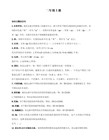
第二十七条
除非公约本部分另有明文规定,当事人按照本部分的规定,以适合情况的方法发出任何通知、要求或其它通知后,这种通知如在传递上发生耽搁或错误,或者未能到达,并不使该当事人丧失依靠该项通知的权利。
第二十八条
如果按照本公约的规定,一方当事人有权要求另一方当事人履行某一义务,法院没有义务做出判决,要求具体履行此一义务,除非法院依照其本身的法律对不属本公约范围的类似销售合同愿意这样做。
(2)接受发价于表示同意的通知送达发价人时生效。如果表示同意的通知在发价人所规定的时间内,如未规定时间,在一段合理的时间内,未曾送达发价人,接受就成为无效,但须适当地考虑到交易的情况,包括发价人所使用的通讯方法的迅速程序。对口头发价必须立即接受,但情况有别者不在此限。
(3)但是,如果根据该项发价或依照当事人之间确立的习惯作法和惯例,被发价人可以做出某种行为,例如与发运货物或支付价款有关的行为,来表示同意,而无须向发价人发出通知,则接受于该项行为做出时生效,但该项行为必须在上一款所规定的期间内做出。
(c)根据法律执行令状或其它令状的销售;
(d)公债、股票、投资证券、流通票据或货币的销售;(e)船舶、船只、气垫船或飞机的销售;
(f)电力的销售。
第三条
(1)供应尚待制造或生产的货物的合同应视为销售合同,除非订购货物的当事人保证供应这种制造或生产所需的大部分重要材料。
(2)本公约不适用于供应货物一方的绝大部分义务在于供应劳力或其它服务的合同。
合同于按照本公约规定对发价的接受生效时订立。
第二十四条
为公约本部分的目的,发价、接受声明或任何其它意旨表示“送达”对方,系指用口头通知对方或通过任何其它方法送交对方本人,或其营业地或通讯地址,如无营业地或通讯地址,则送交对方惯常居住地。
联合国国际货物销售合同公约中英文对照版
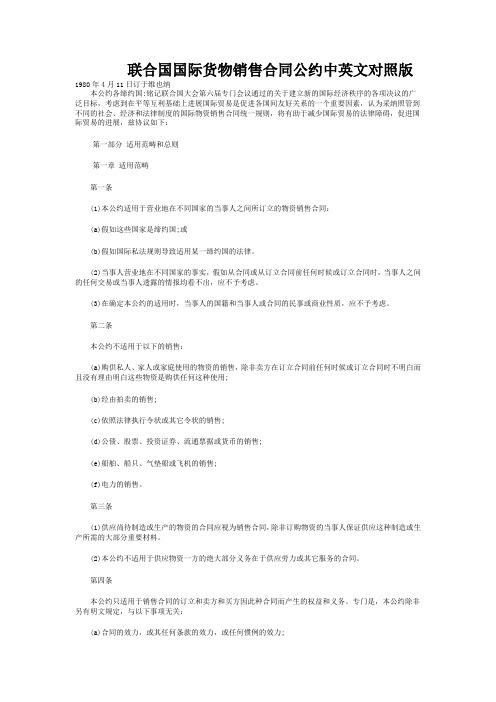
联合国国际货物销售合同公约中英文对照版1980年4月11日订于维也纳本公约各缔约国:铭记联合国大会第六届专门会议通过的关于建立新的国际经济秩序的各项决议的广泛目标,考虑到在平等互利基础上进展国际贸易是促进各国间友好关系的一个重要因素,认为采纳照管到不同的社会、经济和法律制度的国际物资销售合同统一规则,将有助于减少国际贸易的法律障碍,促进国际贸易的进展,兹协议如下:第一部分适用范畴和总则第一章适用范畴第一条(1)本公约适用于营业地在不同国家的当事人之间所订立的物资销售合同:(a)假如这些国家是缔约国;或(b)假如国际私法规则导致适用某一缔约国的法律。
(2)当事人营业地在不同国家的事实,假如从合同或从订立合同前任何时候或订立合同时,当事人之间的任何交易或当事人透露的情报均看不出,应不予考虑。
(3)在确定本公约的适用时,当事人的国籍和当事人或合同的民事或商业性质,应不予考虑。
第二条本公约不适用于以下的销售:(a)购供私人、家人或家庭使用的物资的销售,除非卖方在订立合同前任何时候或订立合同时不明白而且没有理由明白这些物资是购供任何这种使用;(b)经由拍卖的销售;(c)依照法律执行令状或其它令状的销售;(d)公债、股票、投资证券、流通票据或货币的销售;(e)船舶、船只、气垫船或飞机的销售;(f)电力的销售。
第三条(1)供应尚待制造或生产的物资的合同应视为销售合同,除非订购物资的当事人保证供应这种制造或生产所需的大部分重要材料。
(2)本公约不适用于供应物资一方的绝大部分义务在于供应劳力或其它服务的合同。
第四条本公约只适用于销售合同的订立和卖方和买方因此种合同而产生的权益和义务。
专门是,本公约除非另有明文规定,与以下事项无关:(a)合同的效力,或其任何条款的效力,或任何惯例的效力;(b)合同对所售物资所有权可能产生的阻碍。
第五条本公约不适用于卖方关于物资对任何人所造成的死亡或损害的责任。
第六条双方当事人能够不适用本公约,或在第十二条的条件下,减损本公约的任何规定或改变其效力。
CISG_联合国国际货物销售合同公约(中英文对照)

联合国国际货物销售合同公约United Nations Convention On Contracts For The International Sale Of Goods,1980 (CISG)1980年4月11日订于维也纳本公约各缔约国,铭记联合国大会第六届特别会议通过的关于建立新的国际经济秩序的各项决议的广泛目标,考虑到在平等互利基础上发展国际贸易是促进各国间友好关系的一个重要因素,认为采用照顾到不同的社会、经济和法律制度的国际货物销售合同统一规则,将有助于减少国际贸易的法律障碍,促进国际贸易的发展,兹协议如下:THE STATES PARTIES TO THIS CONVENTION,BEARING IN MIND the broad objectives in the resolutions adopted by the sixth special session of the General Assembly of the United Nations on the establishment of a New International Economic Order, CONSIDERING that the development of international trade on the basis of equality and mutual benefit is an important element in promoting friendly relations among States, BEING OF THE OPINION that the adoption of uniform rules which govern contracts for the international sale of goods and take into account the different social, economic and legal systems would contribute to the removal of legal barriers in international trade and promote the development of international trade,HA VE DECREED as follows:第一部分适用范围和总则PART I-Sphere of Application and General Provisions第一章适用范围Chapter I-Sphere of Application第一条(1)本公约适用于营业地在不同国家的当事人之间所订立的货物销售合同:(a)如果这些国家是缔约国;或(b)如果国际私法规则导致适用某一缔约国的法律。
联合国国际货物买卖合同公约中英文对照
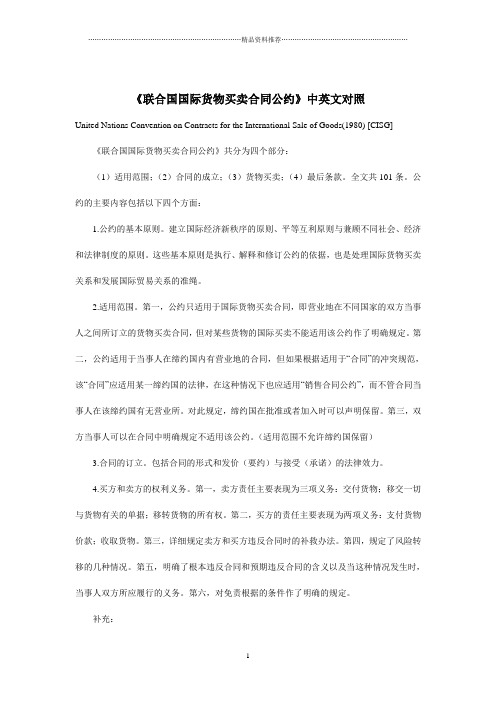
《联合国国际货物买卖合同公约》中英文对照United Nations Convention on Contracts for the International Sale of Goods(1980) [CISG] 《联合国国际货物买卖合同公约》共分为四个部分:(1)适用范围;(2)合同的成立;(3)货物买卖;(4)最后条款。
全文共101条。
公约的主要内容包括以下四个方面:1.公约的基本原则。
建立国际经济新秩序的原则、平等互利原则与兼顾不同社会、经济和法律制度的原则。
这些基本原则是执行、解释和修订公约的依据,也是处理国际货物买卖关系和发展国际贸易关系的准绳。
2.适用范围。
第一,公约只适用于国际货物买卖合同,即营业地在不同国家的双方当事人之间所订立的货物买卖合同,但对某些货物的国际买卖不能适用该公约作了明确规定。
第二,公约适用于当事人在缔约国内有营业地的合同,但如果根据适用于“合同”的冲突规范,该“合同”应适用某一缔约国的法律,在这种情况下也应适用“销售合同公约”,而不管合同当事人在该缔约国有无营业所。
对此规定,缔约国在批准或者加入时可以声明保留。
第三,双方当事人可以在合同中明确规定不适用该公约。
(适用范围不允许缔约国保留)3.合同的订立。
包括合同的形式和发价(要约)与接受(承诺)的法律效力。
4.买方和卖方的权利义务。
第一,卖方责任主要表现为三项义务:交付货物;移交一切与货物有关的单据;移转货物的所有权。
第二,买方的责任主要表现为两项义务:支付货物价款;收取货物。
第三,详细规定卖方和买方违反合同时的补救办法。
第四,规定了风险转移的几种情况。
第五,明确了根本违反合同和预期违反合同的含义以及当这种情况发生时,当事人双方所应履行的义务。
第六,对免责根据的条件作了明确的规定。
补充:CISG 联合国国际货物销售合同公约(the United Nations Convention on Contracts for the International Sale of Goods)。
1980年联合国国际货物买卖合同公约 中英对照版

(a) of goods bought for personal, family or household use, unless the seller, at any time before or at the conclusion of the contract, neither knew nor ought to have known that the goods were bought for any such use; (b) by auction; (c) on execution or otherwise by authority of law; (d) of stocks, shares, investment securities, negotiable instruments or money; (e) of ships, vessels, hovercraft or aircraft; (f) of electricity.
中文 联合国国际货物销售合同公约
United Nations Convention on Contracts for the International Sale of Goods THE STATES PARTIES TO THIS CONVENTION, BEARING IN MIND the broad objectives in the resolutions adopted by the sixth special session of the General Assembly of the United Nations on the establishment of a New International Economic Order, CONSIDERING that the development of international trade on the basis of equality and mutual benefit is an important element in promoting friendly relations among States, BEING OF THE OPINION that the adoption of uniform rules which govern contracts for the international sale of goods and take into account the different social, economic and legal systems would contribute to the removal of legal barriers in international trade and promote the development of international trade, HAVE DECREED as follows: PART I SPHERE OF APPLICATION AND GENERAL PROVISIONS Chapter I SPHERE OF APPLICATION Article 1 (1) This Convention applies to contracts of sale of goods between parties whose places of business are in different States: (a) when the States are Contracting States; or (b) when the rules of private international law lead to the application of the law of a Contracting State. (2) The fact that the parties have their places of business in different States is to be disregarded whenever this fact does not appear either from the contract or from any dealings between, or from information disclosed by, the parties at any time before or at the conclusion of the contract. (3) Neither the nationality of the parties nor the civil or commercial character of the parties or of the contract is to be taken into consideration in determining the application of this Convention. Article 2 This Convention does not apply to sales:
联合国国际货物买卖合同公约中英文对照

《联合国国际货物买卖合同公约》中英文对照United Nations Convention on Contracts for the International Sale of Goods(1980)[CISG]《联合国国际货物买卖合同公约》共分为四个部分:(1)适用范围;(2)合同的成立;(3)货物买卖;(4)最后条款。
全文共101条。
公约的主要内容包括以下四个方面:1.公约的基本原则。
建立国际经济新秩序的原则、平等互利原则与兼顾不同社会、经济和法律制度的原则。
这些基本原则是执行、解释和修订公约的依据,也是处理国际货物买卖关系和发展国际贸易关系的准绳。
2.适用范围。
第一,公约只适用于国际货物买卖合同,即营业地在不同国家的双方当事人之间所订立的货物买卖合同,但对某些货物的国际买卖不能适用该公约作了明确规定。
第二,公约适用于当事人在缔约国内有营业地的合同,但如果根据适用于“合同”的冲突规范,该“合同”应适用某一缔约国的法律,在这种情况下也应适用“销售合同公约”,而不管合同当事人在该缔约国有无营业所。
对此规定,缔约国在批准或者加入时可以声明保留。
第三,双方当事人可以在合同中明确规定不适用该公约。
(适用范围不允许缔约国保留)3.合同的订立。
包括合同的形式和发价(要约)与接受(承诺)的法律效力。
4.买方和卖方的权利义务。
第一,卖方责任主要表现为三项义务:交付货物;移交一切与货物有关的单据;移转货物的所有权。
第二,买方的责任主要表现为两项义务:支付货物价款;收取货物。
第三,详细规定卖方和买方违反合同时的补救办法。
第四,规定了风险转移的几种情况。
第五,明确了根本违反合同和预期违反合同的含义以及当这种情况发生时,当事人双方所应履行的义务。
第六,对免责根据的条件作了明确的规定。
补充:CISG联合国国际货物销售合同公约(the United Nations Convention on Contracts for the International Sale of Goods)。
联合国国际货物销售合同公约(逐句中英文对照)

联合国国际货物销售合同公约(逐句中英文对照)联合国国际货物销售合同公约(United Nations Convention on Contracts for the International Sale of Goods (1980) )PreambleThe States Parties to this Convention Bearing in Mind the broad objectives in the resolutions adopted by the sixth special session of the General Assembly of the United Nations on the establishment of a New International Economic Order. Considering that the development of international trade on the basis of equality and mutual benefit is an important element in promoting friendly relations among States, Being of the Opinion that the adoption of uniform rules which govern contracts for the international sale of goods and take into account the different social, economic and legal systems would contribute to the removal of legal barriers in international trade and promote the development of international trade, have decreed as follows: 本公约个缔约国: 铭记联合国大会第六界特别会议通过的关于建立新的国际经济次序的各项决议的广泛目标, 考虑到在平等互利基础上发展国际贸易, 是促进各国间友好关系的一个重要因素, 认为采用照顾到不同的社会, 经济和法律制度的国际货物销售合同统一规则,将有助于减少国际贸易的法律障碍, 促进国际贸易的发展. 兹协议如下.PART ISphere of Application and General ProvisionsChapter ISphere of ApplicationArticle 1(1)This Convention applies to contracts of sale of goods between parties whose places ofbusiness are in different States: ( 本公约适用于营业地在不同国家的当事人之间所订立的货物销售合同,)(2)(a) when the States are Contracting States; or ( 如果这些国家是缔约国, 或)(b) when the rules of private international law lead to the application of the law of a Contracting State. ( 如果国际私法规则导致适用某一缔约国的法律,)??(2) The fact that the parties have their places of business in different States is to be disregarded whenever this fact does not appear either from the contract or from any dealings between, or from information disclosed by, the parties at any time before or at the conclusion of the contract. ( 当事人营业地在不同国家的事实,如果从合同或从订立合同前任何时候或订立合同时, 当事人之间的任何交易或当事人透露的情报均看不出, 应不予考虑)??(3) Neither the nationality of the parties nor the civil or commercial character of the parties or of the contract is to be taken into consideration in determining the application of this Convention. ( 在确定本公约的适用时, 当事人的国籍和当事人或合同的民事或商业性质,应不予考虑) ??Article 2??This Convention does not apply to sales: ( 本公约不适用以下的销售)??(a) of goods bought for personal, family or household use, unless the seller, at any time before or at the conclusion of the contract, neither knew nor ought to have known that the goods were bought for any such use; ( 购供私人, 家人或家庭使用的货物销售, 除非卖方再订立合同前任何时候或订立合同时不知道而且没有理由知道这些货物是购供任何这种使用)??(b) by auction; ( 经由拍卖销售的)??(c) on execution or otherwise by authority of law; ( 根据法律执行令状或其他领状的销售)??(d) of stocks, shares, investment securities, negotiable (可通过谈判解决的)instruments (手段)or money;( 公债,股票,投资证券, 流通票据或是货币的销售)??(e) of ships, vessels (船只), hovercraft (水翼船)or aircraft;( 船舶船只,气垫船或是飞机的销售)??(f) of electricity. ( 电力的销售)??Article 3??(1) Contracts for the supply of goods to be manufactured or produced are to be considered sales unless the party who orders the goods undertakes to supply a substantial part of the materials necessary for such manufacture or production.( 供应尚待制造或生产的货物的合同应视为销售合同, 除非订购货物的当事人保证供应这种制造或生产所需的大部分重要材料.)??(2) This Convention does not apply to contracts in which the preponderant( 优势的) part of the obligations of the party (当事人)who furnishes the goods consists in the supply of labour or other services.( 本公约不适用于供应货物一方的绝大部分义务在于供应劳力或其它服务的合同)??Article 4??This Convention governs only the formation (形成)of the contract of sale and the rights and obligations of the seller and the buyer arising from (产生)such a contract. In particular, except as otherwise expressly (明确地)provided in this Convention, it is not concerned with: ( 本公约只适用于销售合同的订立和卖方和买方因此种合同而产生的权利和义务. 特别是本公约除非另有明文规定, 与以下事项无关:)??(a) the validity (效力)of the contract or of any of its provisions (供应)or of any usage;( 合同的效力,或其任何条款的效力,或任何惯例的效力)??(b) the effect which the contract may have on the property in the goods sold. (合同对所销售物所有权可能产生的影响。
联合国1980销售合同公约中英文对照

联合国1980销售合同公约中英文对照
1. 合同双方:
2. 商品描述:
商品的详细描述和规格
商品的数量和单价
商品的质量标准和包装要求
3. 交付条件:
交货地点和交货日期
运输方式和费用负担
包装和标记要求
4. 付款条款:
付款金额和货币种类
付款方式和分期支付安排
延迟支付的利息和违约金条款
5. 检验和接受:
检验的时间和方法
不合格商品的处理方式
6. 拒绝和退货:
商品未能符合合同规定的质量标准
商品与合同描述不符或存在瑕疵
7. 保修和赔偿:
商品质量问题或不符合保证
延迟交货引起的损失
8. 合同终止:
双方协商一致决定终止
一方严重违约导致无法继续履行合同义务
9. 争议解决:
通过友好协商解决
如协商不成,提交至 [仲裁机构] 仲裁
10. 其他条款:
本合同自签署之日起生效。
未尽事宜,由双方协商解决,签署方需在本合同中签字确认。
签署人:
买方:[买方公司名称] 签字:__________________ 日期:
___________
卖方:[卖方公司名称] 签字:__________________ 日期:
___________
这份合同按照中的设计要求,列出了关键的合同信息项,并在文中进行了明确的列举和描述,以确保双方对合同内容的清晰理解和确认。
联合国国际货物买卖合同公约中英文对照

联合国国际货物买卖合同公约中英文对照《联合国国际货物买卖合同公约》中英文对照United Nations Convention on Contracts for the International Sale of Goods(1980) [CISG] 《联合国国际货物买卖合同公约》共分为四个部分:(1)适用范围;(2)合同的成立;(3)货物买卖;(4)最后条款。
全文共101条。
公约的主要内容包括以下四个方面:1.公约的基本原则。
建立国际经济新秩序的原则、平等互利原则与兼顾不同社会、经济和法律制度的原则。
这些基本原则是执行、解释和修订公约的依据,也是处理国际货物买卖关系和发展国际贸易关系的准绳。
2.适用范围。
第一,公约只适用于国际货物买卖合同,即营业地在不同国家的双方当事人之间所订立的货物买卖合同,但对某些货物的国际买卖不能适用该公约作了明确规定。
第二,公约适用于当事人在缔约国内有营业地的合同,但如果根据适用于“合同”的冲突规范,该“合同”应适用某一缔约国的法律,在这种情况下也应适用“销售合同公约”,而不管合同当事人在该缔约国有无营业所。
对此规定,缔约国在批准或者加入时可以声明保留。
第三,双方当事人可以在合同中明确规定不适用该公约。
(适用范围不允许缔约国保留)3.合同的订立。
包括合同的形式和发价(要约)与接受(承诺)的法律效力。
4.买方和卖方的权利义务。
第一,卖方责任主要表现为三项义务:交付货物;移交一切与货物有关的单据;移转货物的所有权。
第二,买方的责任主要表现为两项义务:支付货物价款;收取货物。
第三,详细规定卖方和买方违反合同时的补救办法。
第四,规定了风险转移的几种情况。
第五,明确了根本违反合同和预期违反合同的含义以及当这种情况发生时,当事人双方所应履行的义务。
第六,对免责根据的条件作了明确的规定。
补充:CISG 联合国国际货物销售合同公约(the United Nations Convention on Contracts for the International Sale of Goods)。
联合国国际货物销售合同公约中英文对照版

联合国国际货物销售合同公约中英文对照版联合国国际货物买卖合同公约1980年4月11日订于维也纳本公约各缔约国:铭记联合国大会第六届特别会议通过的关于建立新的国际经济秩序的各项决议的广泛目标,考虑到在平等互利基础上发展国际贸易是促进各国间友好关系的一个重要因素,认为采用照顾到不同的社会、经济和法律制度的国际货物销售合同统一规则,将有助于减少国际贸易的法律障碍,促进国际贸易的发展,兹协议如下:第一部分适用范围和总则第一章适用范围第一条(1)本公约适用于营业地在不同国家的当事人之间所订立的货物销售合同:(a)如果这些国家是缔约国;或(b)如果国际私法规则导致适用某一缔约国的法律。
(2)当事人营业地在不同国家的事实,如果从合同或从订立合同前任何时候或订立合同时,当事人之间的任何交易或当事人透露的情报均看不出,应不予考虑。
(3)在确定本公约的适用时,当事人的国籍和当事人或合同的民事或商业性质,应不予考虑。
第二条本公约不适用于以下的销售:(a)购供私人、家人或家庭使用的货物的销售,除非卖方在订立合同前任何时候或订立合同时不知道而且没有理由知道这些货物是购供任何这种使用;(b)经由拍卖的销售;(c)根据法律执行令状或其它令状的销售;(d)公债、股票、投资证券、流通票据或货币的销售;(e)船舶、船只、气垫船或飞机的销售;(f)电力的销售。
第三条(1)供应尚待制造或生产的货物的合同应视为销售合同,除非订购货物的当事人保证供应这种制造或生产所需的大部分重要材料。
(2)本公约不适用于供应货物一方的绝大部分义务在于供应劳力或其它服务的合同。
第四条本公约只适用于销售合同的订立和卖方和买方因此种合同而产生的权利和义务。
特别是,本公约除非另有明文规定,与以下事项无关:(a)合同的效力,或其任何条款的效力,或任何惯例的效力;(b)合同对所售货物所有权可能产生的影响。
第五条本公约不适用于卖方对于货物对任何人所造成的死亡或伤害的责任。
联合国国际货物销售合同公约中英文对照版
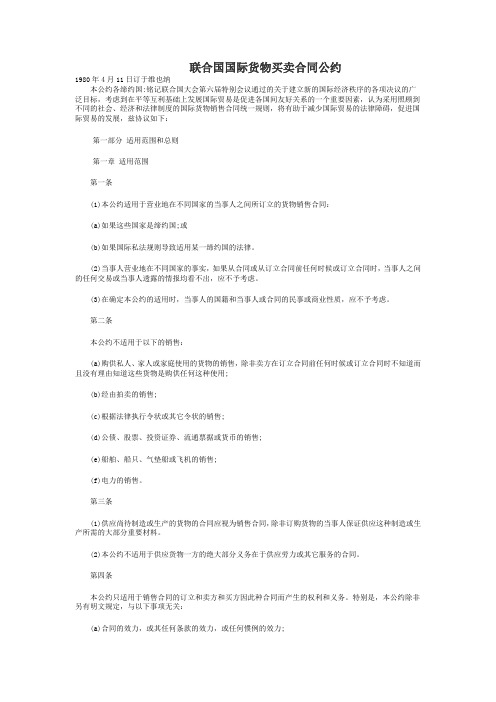
联合国国际货物买卖合同公约1980年4月11日订于维也纳本公约各缔约国:铭记联合国大会第六届特别会议通过的关于建立新的国际经济秩序的各项决议的广泛目标,考虑到在平等互利基础上发展国际贸易是促进各国间友好关系的一个重要因素,认为采用照顾到不同的社会、经济和法律制度的国际货物销售合同统一规则,将有助于减少国际贸易的法律障碍,促进国际贸易的发展,兹协议如下:第一部分适用范围和总则第一章适用范围第一条(1)本公约适用于营业地在不同国家的当事人之间所订立的货物销售合同:(a)如果这些国家是缔约国;或(b)如果国际私法规则导致适用某一缔约国的法律。
(2)当事人营业地在不同国家的事实,如果从合同或从订立合同前任何时候或订立合同时,当事人之间的任何交易或当事人透露的情报均看不出,应不予考虑。
(3)在确定本公约的适用时,当事人的国籍和当事人或合同的民事或商业性质,应不予考虑。
第二条本公约不适用于以下的销售:(a)购供私人、家人或家庭使用的货物的销售,除非卖方在订立合同前任何时候或订立合同时不知道而且没有理由知道这些货物是购供任何这种使用;(b)经由拍卖的销售;(c)根据法律执行令状或其它令状的销售;(d)公债、股票、投资证券、流通票据或货币的销售;(e)船舶、船只、气垫船或飞机的销售;(f)电力的销售。
第三条(1)供应尚待制造或生产的货物的合同应视为销售合同,除非订购货物的当事人保证供应这种制造或生产所需的大部分重要材料。
(2)本公约不适用于供应货物一方的绝大部分义务在于供应劳力或其它服务的合同。
第四条本公约只适用于销售合同的订立和卖方和买方因此种合同而产生的权利和义务。
特别是,本公约除非另有明文规定,与以下事项无关:(a)合同的效力,或其任何条款的效力,或任何惯例的效力;(b)合同对所售货物所有权可能产生的影响。
第五条本公约不适用于卖方对于货物对任何人所造成的死亡或伤害的责任。
第六条双方当事人可以不适用本公约,或在第十二条的条件下,减损本公约的任何规定或改变其效力。
联合国国际货物销售合同公约(CISG)--中英文对照
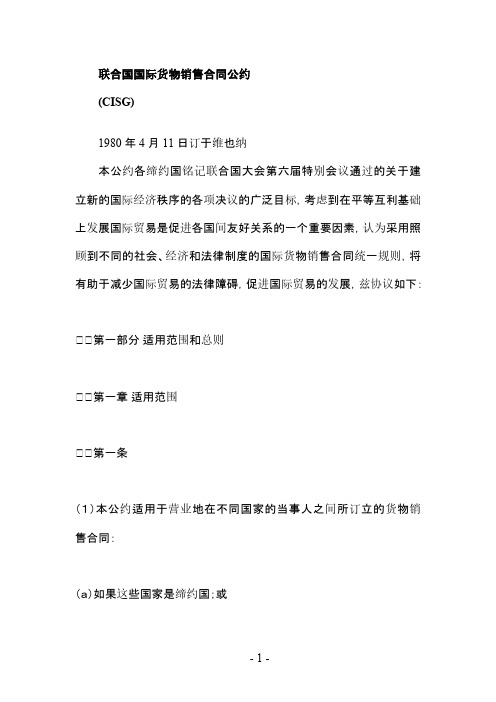
第十四条
(1)向一个或一个以上特定的人提出的订立合同的建议,如果十分确 -7-
定并且表明发价人在得到接受时承受约束的意旨,即构成发价。一个 建议如果写明货物并且明示或暗示地规定数量和价格或规定如何确 定数量和价格,即为十分确定。
(2)非向一个或一个以上特定的人提出的建议,仅应视为邀请做出发 价,除非提出建议的人明确地表示相反的意向。
第一部分 适用范围和总则
第一章 适用范围
第一条
(1)本公约适用于营业地在不同国家的当事人之间所订立的货物销 售合同:
(a)如果这些国家是缔约国;或
-1-
(b)如果国际私法规则导致适用某一缔约国的法律。
(2)当事人营业地在不同国家的事实,如果从合同或从订立合同前任 何时候或订立合同时,当事人之间的任何交易或当事人透露的情报均 看不出,应不予考虑。
联合国国际货物销售合同公约 (CISG) 1980 年 4 月 11 日订于维也纳 本公约各缔约国铭记联合国大会第六届特别会议通过的关于建 立新的国际经济秩序的各项决议的广泛目标,考虑到在平等互利基础 上发展国际贸易是促进各国间友好关系的一个重要因素,认为采用照 顾到不同的社会、经济和法律制度的国际货物销售合同统一规则,将 有助于减少国际贸易的法律障碍,促进国际贸易的发展,兹协议如下:
(d)公债、股票、投资证券、流通票据或货币的销售; (e)船舶、船只、气垫船或飞机的销售; (f)电力的销售。 第三条 (1)供应尚待制造或生产的货物的合同应视为销售合同,除非订购货 物的当事人保证供应这种制造或生产所需的大部分重要材料。 (2)本公约不适用于供应货物一方的绝大部分义务在于供应劳力或 其它服务的合同。 第四条 本公约只适用于销售合同的订立和卖方和买方因此种合同而产生 的权利和义务。特别是,本公约除非另有明文规定,与以下事项无关:
联合国1980销售合同公约中英文对照

联合国1980销售合同公约中英文对照As a language model, I am here to provide you with a detailed and accurate document on the 1980 Sales Contract Convention of the United Nations, ensuring clarity and coherence in the content. The primary focus of this article will be to present the key provisions and its significance within the legal framework.The 1980 Sales Contract Convention, also known as the Vienna Sales Convention (VSC), was a significant international agreement that aimed to harmonize and streamline the process of international commercial transactions. Adopted in 1980, it has been ratified by numerous countries worldwide, reflecting its universal appeal.The Convention, which is based on the principle of "maximum harmonization," sets out rules for the formation, performance, and interpretation of sales contracts involving goods. It primarily covers the following aspects:1. Formation: The VSC defines the elements necessary for a valid sales contract, such as offer, acceptance, and consideration. It clarifies that a contract is formed when an offer is made, accepted, and communicated in writing.2. Performance: The Convention emphasizes the principle of "performance by delivery," which means that the seller's obligation is fulfilled by physically delivering the goods to the buyer. It also addresses the risk transfer, with the risk passing upon delivery.3. Liability: The Convention provides a clear definition of the liability of both parties. It sets out that the buyer is primarily responsible for any non-performance due to their own fault, while the seller is liable for defects in the goods.4. Dispute Resolution: The Convention encourages the use of arbitration as the primary method for resolving disputes arising from sales contracts. It also allows for the possibility of judicial intervention in exceptional cases.5. Choice of law: The Convention allows contracting parties to choose their preferred law for the contract, but it also promotes the application of the law of the country where the goods are located or where the contract is made.6. Protection of Consumers: The Convention, while primarily catering to commercial transactions, also includes provisions to protect consumers in certain cases, such as the right to return goods under specific circumstances.The 1980 Sales Contract Convention has been instrumental in promoting international trade by providing a common set of rules for businesses engaging in cross-border transactions. It has reduced legal uncertainties and facilitated the exchange of goods and services across borders.In conclusion, the Vienna Sales Convention is a vital tool in the global legal landscape, fostering a stable and predictable environment for international commerce. Its continued adoption and implementation by countries worldwide underscores its enduring relevance and importance in the modern era of globalization.。
980年联合国国际货物买卖合同公约 中英对照版

character of the parties or of the 保护
contract is to be taken into (b)经由拍卖的销售;(特
consideration in determining the 殊规则)
application of this Convention.
(c)根据法律执行令状或
States:
立合同时,当事人之间的任
(a) when the States are Contracting 何交易或当事人透露的情报
States; or
均看不出,应不予考虑。
(b) when the rules of private (3)在确定本公约的适用
international law lead to the 时,当事人的国籍和当事人
equality and mutual benefit is an 素,认为采用照顾到不同的
important element in promoting friendly 社会、经济和法律制度的国
relations among States,
际货物销售合同统一规则,
BEING OF THE OPINION that the adoption 将有助于减少国际贸易的法
any time before or at the conclusion of 卖方在订立合同前任何时候
the contract.
或订立合同时不知道而且没
(3) Neither the nationality of the 有理由知道这些货物是购供
parties nor the civil or commercial 任何这种使用;消费者权益
economic and legal systems would 第一章 适用范围
- 1、下载文档前请自行甄别文档内容的完整性,平台不提供额外的编辑、内容补充、找答案等附加服务。
- 2、"仅部分预览"的文档,不可在线预览部分如存在完整性等问题,可反馈申请退款(可完整预览的文档不适用该条件!)。
- 3、如文档侵犯您的权益,请联系客服反馈,我们会尽快为您处理(人工客服工作时间:9:00-18:30)。
a
. ..
Article 2 This Convention does not apply to sales: (a) of goods bought for personal, family or household use, unless the seller, at any time before or at the conclusion of the contract, neither knew nor ought to have known that the goods were bought for any such use; (b) by auction; (c) on execution or otherwise by authority of law; (d) of stocks, shares, investment securities, negotiable instruments or money; (e) of ships, vessels, hovercraft or aircraft; (f) of electricity.
1980 年 4 月 11 日订于维也纳 本公约各缔约国铭记联合国大
会第六届特别会议通过的关于建立 新的国际经济秩序的各项决议的广 泛目标,考虑到在平等互利基础上 发展国际贸易是促进各国间友好关 系的一个重要因素,认为采用照顾 到不同的社会、经济和法律制度的 国际货物销售合同统一规则,将有 助于减少国际贸易的法律障碍,促 进国际贸易的发展,兹协议如下:
第一部分 适用围和总则 第一章 适用围 第一条 (1)本公约适用于营业地在不同 的当事人之间所订立的货物销售合 同: (a)如果这些是缔约国;或 (b)如果国际私法规则导致适用 某一缔约国的法律。扩大适用,国 际私法规
(2)当事人营业地在不同的事实, 如果从合同或从订立合同前任何时 候或订立合同时,当事人之间的任 何交易或当事人透露的情报均看不 出,应不予考虑。
. ..
一、1980 年联合国国际货物买卖合同公约 英文 United Nations Convention on Contracts for the Internation际货物销售合同公约
THE STATES PARTIES TO THIS CONVENTION, BEARING IN MIND the broad objectives in the resolutions adopted by the sixth special session of the General Assembly of the United Nations on the establishment of a New International Economic Order, CONSIDERING that the development of international trade on the basis of equality and mutual benefit is an important element in promoting friendly relations among States, BEING OF THE OPINION that the adoption of uniform rules which govern contracts for the international sale of goods and take into account the different social, economic and legal systems would contribute to the removal of legal barriers in international trade and promote the development of international trade, HAVE DECREED as follows: PART I SPHERE OF APPLICATION AND GENERAL PROVISIONS Chapter I SPHERE OF APPLICATION Article 1 (1) This Convention applies to contracts of sale of goods between parties whose places of business are in different States: (a) when the States are Contracting States; or (b) when the rules of private international law lead to the application of the law of a Contracting State. (2) The fact that the parties have their places of business in different States is to be disregarded whenever this fact does not appear either from the contract or from any dealings between, or from information disclosed by, the parties at any time before or at the conclusion of the contract. (3) Neither the nationality of the parties nor the civil or commercial character of the parties or of the contract is to be taken into consideration in determining the application of this Convention.
